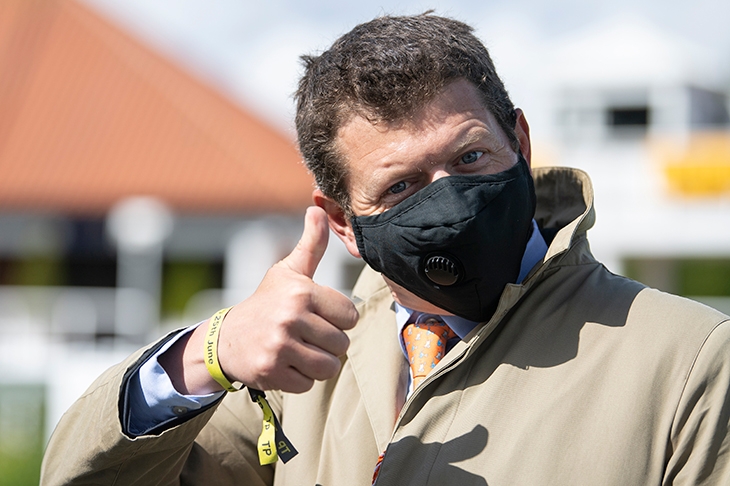Horse racing, it turns out, wasn’t the first sport back in post-lockdown action: that distinction went to pigeon racing when some 4,400 birds took to the air and raced from Kettering to Barnsley. Nor did the first Classic, the 2,000 Guineas at Newmarket, provide the hoped-for tonic headlines about a new super-horse to succeed the great Frankel. Pinatubo, a scintillating winner of all his six races as a juvenile and the highest-rated two-year-old since 1994, ran a perfectly respectable race to finish third, but the high hopes that the hot favourite was going to prove to be something truly special were dashed. It seems that the bigger, rangier types caught up with Godolphin’s compact little star over the winter. Indeed the virus-inspired month’s delay in staging the 2,000 may have helped them to do so.
But almost everything else about the 2,000 Guineas result was a massive positive. We cannot for the moment have our Hen and Terry moments with Best Mate’s trainer and her husband locked in a slo-mo passionate embrace over his third Gold Cup success, or the whooping, jumping, back-slapping exhilaration of successful syndicates. On television we had to make do initially with a back view of masked trainer Andrew Balding as Kameko came home a worthy winner of the first Classic and we could not hear the roar of exhilaration from jockey Oisin Murphy as he won. It was, all the same, a significant and fitting victory. When Aidan O’Brien’s Wichita — ridden, thanks to Covid-19 regulations, not by an Irish-based jockey but by Frankie Dettori — took the lead two furlongs out, it looked as though the Irish genius might be about to win his 11th 2,000 Guineas (good for him, but a little too predictable to be good for the sport). But then Kameko, on whom the cool Oisin Murphy had not had the easiest of passages, angled right out of the pack and battled past the Irish challenger for a victory that looked in the end more convincing than the official neck margin.
Fittingly, it gave the young champion jockey his first Classic success on a horse trained by Andrew Balding, the man whose famed apprentice academy at Kingclere helped to mould the now thoughtful Oisin into the outstanding jockey he has become, renowned for his work ethic, professionalism and meticulous preparation. What makes it even better is that Oisin is a polite and thoughtful interviewee. He has to be a diplomat. One of the difficulties of being the retained jockey for an outfit like Qatar Racing, as Oisin has noted, is that with its horses spread around different stables you are sometimes riding for trainers for whom you would not otherwise be the first choice. Andrea Atzeni left after only one season, Jamie Spencer departed after two.
The mutual respect of the winning jockey and trainer shone through this year’s 2,000 Guineas post-mortems. Andrew won the Oaks with Casual Look soon after taking over from his father Ian but this was a first 2,000 Guineas triumph for him and it will surely have been a great satisfaction to his father who was denied success in the race when Mill Reef came up against Brigadier Gerard in one of its best contests ever 49 years ago. Nor should we forget the winning Qatari owner, Sheikh Fahad al-Thani, whose interest in racing was first sparked by a visit from Cambridge to see the Guineas and whose Qipco Holdings have sponsored the race now for ten years. What a bargain Qatar Racing’s guiding light David Redvers secured when he bought Kameko, a Kitten’s Joy colt, for just $90,000.
The joy of racing is that every time a question is answered, this time about Pinatubo, a new question emerges. And the big one now is will Kameko, firmly installed as the favourite for Epsom in a month’s time, cope with the idiosyncrasies of the Derby course and its extra half-mile? As a two-year-old, Kameko won over Newcastle’s stiff mile and connections have no doubt that he will stay a mile and a quarter. As for the question mark over the remaining two furlongs, Andrew’s response is that there is only one way to find out — and there is only one Derby. Good luck to them all.
Some suggest that it is unfair that racing is back, behind closed doors, before other sports resume but there is a simple reason. Cricketers, footballers and others need a period of fitness training first. Training gallops never stopped. Racing is well aware, though, of its responsibilities. As Martin Cruddace of Arena Racing put it: ‘If we don’t do it right it could be taken away,’ and the co-operation is there. ‘Legging up’ apart, social distancing is being maintained. Participants are completing virus modules and health questionnaires and having their temperatures taken on arrival. To stop them looking backwards in the starting stalls, jockeys eager to break well are being kept informed about the progress of loading and one upside is that two-year-olds are benefitting from the quiet on their racecourse introduction.






Comments